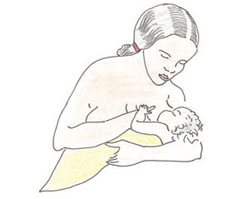1.2.1 Naturally acquired immunity
Naturally acquired immunity occurs ‘naturally’ without any intervention from a health professional. The difference between the ‘active’ and the ‘passive’ forms depends on whether the immune person makes the antibodies themselves (actively), or gets them from someone else (passively).
Naturally acquired active immunity
Naturally acquired active immunity occurs after an infection activates the person’s immune system. For example, non-immunized children who develop measles and recover from the illness, get better because they have made an effective immune response against the measles virus. As a result, they acquire protection from measles for the rest of their lives (i.e. they are immune to measles). They have naturally acquired active immunity because the protection developed naturally in their bodies, without a vaccine being given. The immunity is active because the children produced their own antibodies and memory cells, which specifically attack any invading measles viruses they meet in the future.
Naturally acquired passive immunity

Naturally acquired passive immunity occurs when a mother gives her own antibodies to her baby, transferring them from her blood to the fetal blood across the placenta, or giving them to the baby in her breastmilk. The immunity created by these maternal antibodies is naturally acquired from the mother (without any medical intervention). During the first few months of a baby’s life, until the mother stops breastfeeding, her antibodies provide passive protection to the baby against infectious agents that the mother has encountered during her own life. The term ‘passive’ is used because the baby didn’t produce the antibodies itself. The active production of antibodies by the immune system of the baby takes several years to develop properly.
Information about fetal, maternal and placental circulation is given in Box 5.2 in Study Session 5 of the Antenatal Care Module.
Do you know that the tetanus vaccine given to a mother during antenatal care will also protect the newborn infant from tetanus for the first few weeks or months of its life? This is because the maternal antibodies against tetanus bacteria cross the placenta and get into the fetus.
1.2 Types of specific immunity
